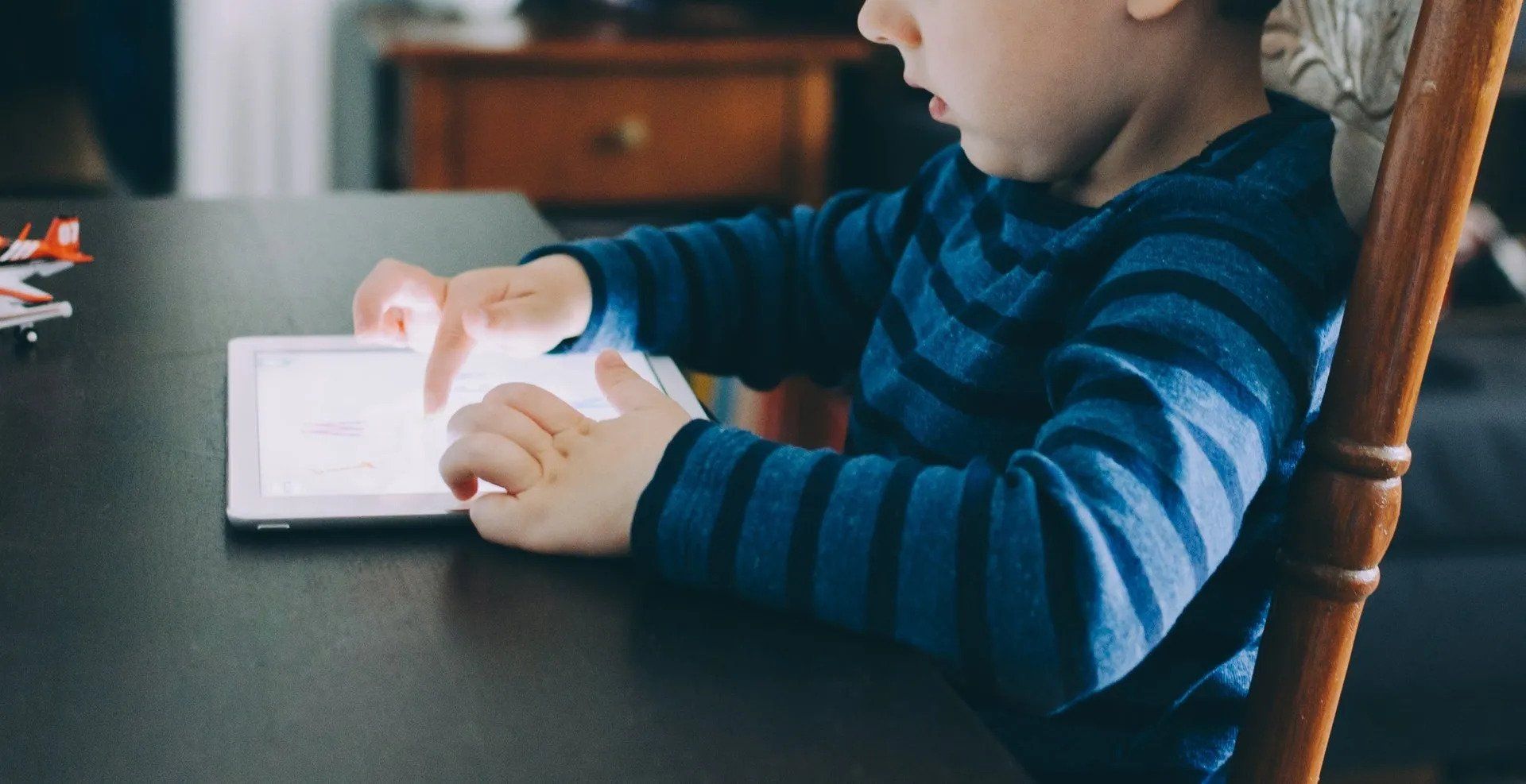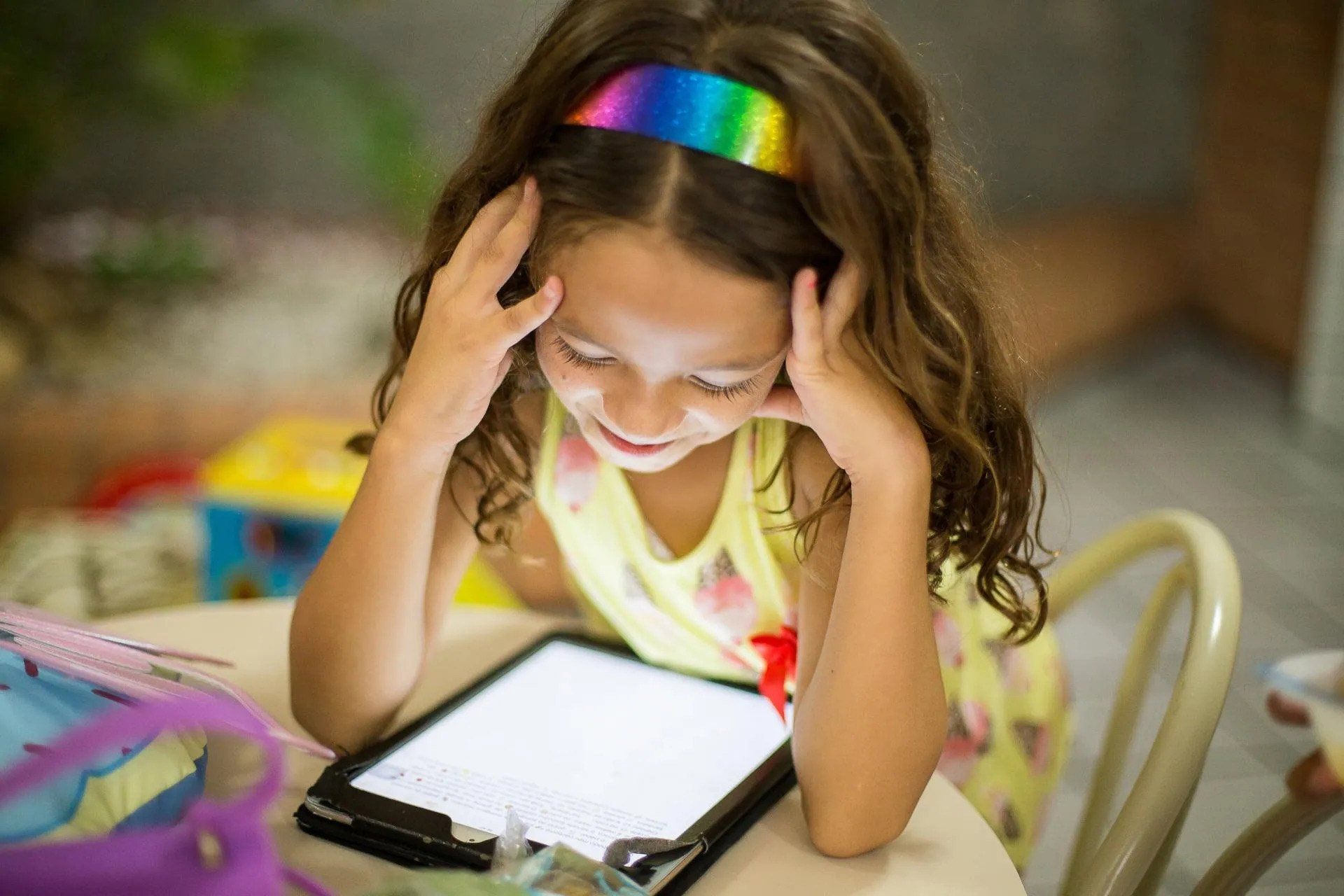10 TIPS TO HELP YOUR CHILD COPE USING DIGITAL SCREENS
10 April 2019

SCIENTIFIC EVIDENCE STRONGLY INDICATES THAT CHILDREN’S USE OF COMPUTER SCREENS, MOBILE PHONES, TABLETS AND OTHER DEVICES CAN CAUSE VISUAL PROBLEMS. HERE ARE SOME TIPS TO HELP REDUCE THIS LIKELIHOOD:-
1.
Encourage moderation in near vision screen time
- (see recommendations on age related screen time) Studies show that children who spend more than 2 hours a day on screens, and less than 1 ½ hours outdoors, are more likely to become short-sighted. Consider reducing your own screen time as an example to your children.
2.
Ensure Good Working Distance
- Your child’s posture and working distance are so important as they grow, and device should
be no closer than the distance from their nose to their elbow.
Never read lying on your stomach, as the viewing distance will be much closer. Excessive, extremely close smartphone use can cause severe eye coordination problems.
3.
Change Focus
-
When reading an electronic document or book, encourage your children to look up and away as they turn the page or after 20mins of screen time. Set your smart phone to or pad to remind them when the time is up. The Hansenoptom phone App also has a great function to do this.
4.
Take longer Breaks
– For every hour using screens insist your child has a 10min break. Again set a timer to remind your child.
Consider Lighting and screen glare
- Avoid using computer, phones or tablets outside or in brightly lit areas, as the lighting and glare differences can create strain.
5.
Limit use while travelling
- Limit the use of computers, phones or tablets while traveling in a car as it can cause eye strain and motion sickness – use the opportunity to look far, play games and enjoy your surroundings.
6.
Make sure the screen is not too bright
- Adjust the brightness of the device your child is using for the light and circumstances.
7.
Use healthy food distractions
- Create a distraction that causes your child to look up every now and then or to leave the screen such as giving them (healthy) snacks occasionally.
8.
Stop screen use for an hour before bed time - Studies show that screen use just before bed can increase the risk of a child failing to fall asleep and staying asleep.
9. Don’t get into bad habits - The temptation can be to use a screen as a bay sitting device and allow your child to use your mobile phones or tablet to keep occupied while you want do other things or to quieten them down. The risk is that you may subconsciously condition your child to expect to play on your phone or tablet whenever they are upset or when you are otherwise occupied.
10.
Promote regular outdoor activities - When in doubt Children who spend more time outdoors are less likely to be, or to become myopic, irrespective of how much near work they do, or whether their parents are myopic. Outdoor time has a significant protective effect against developing some types of myopia.

What is Dry Eye Disease? Dry eye disease is a common condition that occurs when your tears aren't able to provide adequate protection for your eyes. The majority of cases of dry eye are not caused by a lack of tears, but rather tears that are of poor quality. This causes the tear film (the protective layer on the front of your eye) to become unstable, thus directly exposing your eye to the elements leading to symptoms of stinging, redness, irritation and even blur. The most common cause of dry eye is due to the oil producing glands in your eyelids slowing down, clogging up, and in some cases even dying. This can lead to permanent damage to the cornea, the sensitive front layer of the eye, as well as vision loss. How can I treat Dry Eye? Regular heat and gentle massage are great ways to improve the function of the oil producing glands and promote a healthy tear film. Another great form of treatment is an oil-based eye drop, which supplements the lack of natural oils being produced. Vitamin A is also effective in restoring damaged corneal epithelium. What are some common symptoms of Dry Eye? If you are suffering from the below symptoms, book an appointment with one of our Optometrists today. Optometrist Justin Clunas runs a comprehensive Dry Eye Clinic at our practice, although all of our Optometrists are experienced in treating Dry Eye. Symptoms: • stinging or burning • itchiness (particularly in the corners of the eyes) • fluctuating vision • redness • tired eyes • mucus around the eyelids, particularly upon waking • a feeling of grittiness, or the sensation of something foreign in the eye

Do you suffer from sore, itchy eyes? You may have an allergic Conjunctivitis or Hay Fever of the eyes! At this time of the year (especially with all the dust in the air) a lot of us are suffering from allergic reactions. Allergy reactions in the eye are usually due to airborne allergens, contact allergens, and reactions to allergens associated with various microbial agents (bacteria, viruses etc). Sometimes eye allergies can be due to systemic hypersensitivity. In other words, something that is causing an allergic response in the whole body. Hence the only true way to cure an allergy is either to: 1. Remove the cause of the allergy. This may not always be practical or it may be difficult to isolate a single allergen as the cause. OR 2. Become desensitised to the particular allergen. Course of immunotherapy provided by an allergist may help desensitise the patient to specific allergens, however, may only be considered in severe cases due to the expense and time involved in testing and the treatment. OCULAR ALLERGIES are mainly associated with HAY FEVER. ALLERGEN: Most common agents are pollens, animal hairs or danders, feathers, mould spores, house dust, insects and scents. SYMPTOMS: Patients complain of moderate itching, tearing, burning, and a feeling of pressure behind the eye. A stringy discharge maybe present. The eyes may be red with slight swelling in the lids and small papillae (little bumps) under the top and bottom eye lids. TREATMENT: a) Irrigation at least 5 x daily with lubricating eye drops. Single dose units are very good because they are unpreserved, simple and inexpensive to use. You cannot overuse lubricating eye drops and although they do not cure the allergy they will significantly help alleviate the symptoms. b) You can also apply cold compresses (cold face washer) on the closed eyes to help relieve the itchy discomfort. c) Severe symptoms may need a decongestant / antihistamine eye drop. If you are not sure if you have an allergic conjunctivitis, come in and let us examine your eyes to advise you on the best treatment. You do not need an appointment! We see every sore eye then and there to make sure you do not have any other significant cause of your itchy or sore eyes.

When it comes to reading, one of the earliest skills your child has to learn is how to move their eyes across a line of print without losing their place as they go from word to word or line to line. This is called a Reading Eye Movement (REM) . It is a learnt visual motor skill that we don’t use for any other task. It involves the eyes rapidly jumping (a saccadic eye movement) from word to word. We then do a brief fixation of the word to allow the brain to intrude its meaning (Comprehension) . When we are learning to read we fixate each letter in a word to sound it out. As we gradually develop a repertoire of words that we recognise straight away (sight words) we do fewer fixations and take in more words per fixation. A good reader can comprehend up to 18 characters per fixation (includes spaces between words) . A poor reader needs to fixate ever letter or word.

They will get lost in my eye and go around the back and get stuck in my brain. This is physically impossible, scary thought but cannot happen. the eyelids forma seal onto the eye-globe so they can go no further. They will pop out spontaneously of if I get bumped on the back of the head, just like in the old movies. Not happening. Even playing sport or other activities they shouldn't fall out. Even in water it is quite difficult to lose a lens. Mostly they move out of place and we can blink them back into place. They are uncomfortable!!! New technologies, new surfacing and design means that the current soft contact lens designs are the most comfortable ever and you will never know they are even in there. They are difficult to maintain. Daily disposable lenses are the easiest care yet...put them in, wear them for a day and discard for a fresh pair tomorrow! They can get stuck permanently. They will not get stuck but with most lenses remove them before sleep. They can melt in your eyes! Unless diving into a volcano, this is impossible...despite the long lived trade stories of welders wearing contacts which melted onto the eyes, this just can't happen. They will stop you crying while cutting onions. Actually this one is true. So try some today and "Masterchef" away!

It really depends on how old your child is! There is strong scientific evidence excessive computer and screen use is associated with a greater risk of developing short-sightedness as well as increased symptoms of eyestrain, headaches, blurred vision, dry eyes, and neck and shoulder pain, due to our eyes focusing and aiming close-up for very long periods. When your child is reading from electronic devices it requires more effort and is more fatiguing than from hard copy such as books. The Australasian College of Behavioural Optometrists (ACBO) recommends the following guidelines for children using near vision screen equipment AGE

The day started off like any other work day, except we'd be closing early to fill our brains with inspiration and innovation for the future. Off we went on our REX flight to Sydney, then onto our next flight with Virgin to sunny Broadbeach on the Gold Coast. It's now Friday, we all wake up eager for the weekend ahead but first a quick trip to the beach followed by a team lunch at the beautiful Kurrawa Surf Club, where we brainstormed ideas and ate too much.

“Macular Degeneration is the leading cause of blindness and severe vision loss in Australia” The macular is the central and one of the most important parts of the retina at the back of the eye. Like the film in a camera it is the light sensitive tissue responsible for processing all visual images. The area of the macular is only very small part of the entire retina, less than 1/8th , and yet it supplies almost all the detailed information that we need to function in the world. Even the smallest damage or haemorrhage at the centre of the macular would seriously decrease our ability to see details such words, faces or pass a driving test. As such while Macular Degeneration is a major cause of legal blindness it is also a major cause of visual disability even before getting to that point. ”1 in 7 Australians over the age of 50 has some evidence of macular degeneration and this does increase with age” There are two types of macular degeneration dry and wet . While the dry causes a gradual decrease in central visual loss the wet form can be sudden with bleeding and new blood vessels forming and needs rapid attention. As with many diseases early detection is very important in deciding the final degree of visual loss.

Orange Daybreak Rotary will work with other Rotary clubs in the area to raise awareness and funds to help eliminate trachoma in Australia. Trachoma is the leading cause of infectious disease globally and Australia remains to be the last leading country with this infectious disease. Trachoma is spread by personal contact (via hands, clothing, bedding or towels) or by flies that have been in contact with an infected person. Trachoma causes scarring to the eyelids which rub on the cornea of the eye resulting in blindness in severe cases. Trachoma is an entirely preventable disease, and infections can be treated quickly and effectively. By preventing unnecessary blindness, we secure a better future for Indigenous Australians. Orange daybreak wants to motivate each person in our district and as many Rotarians as possible to play an important part in ended Trachoma by 2020. The work of the Australian Government, the Fred Hollows Foundation and Indigenous Eye Health to treat trachoma infections has seen rates in affected communities reduced to complete elimination of the disease. But now, we need to ensure that hygiene practices and the community environments are improved to completely eliminate the disease. For more information visit: https://www.endtrachoma2020.org.au To donate visit: https://www.endtrachoma2020.org.au/donate

Take a walk with us as we explore the revived style that is, the ‘panto’ frame. Vintage glamour is something we’ve recently seen slowly start to creep back in and people are loving it. Like clothing, fashion trends come and go, and of recent ’round frames’ have come back with a vengeance, however… it got us thinking about where this style all started.

Your eye functions similar to an old-style camera. In the camera, the light comes in through the shutter, is focused by the lens, falls onto the film and then it’s processed. In your eye, light comes in through the cornea and pupil. It is focused by the lens, falling onto the film in the eye (the retina) and then goes, via the optic nerve (the nerve of sight), to the brain (the processor) for developing. For people living with glaucoma, there has been damage done to the optic nerve, causing some of the images captured by the eye to not reach the brain, which can result in progressive vision loss. This damage that is done to the optic nerve can be caused by injury or by poor blood flow. In most cases, the damage which is done to the optic nerve is from pressure within the eye.

